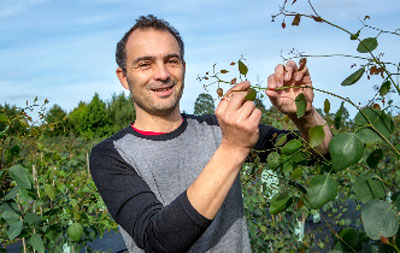
Dr Altaner
An innovative team at the University of Canterbury’s (UC) School of Forestry is working to find a solution to a key challenge facing New Zealand’s forestry industry. A new breeding programme could determine which durable sustainable eucalyptus varieties are best for producing high quality wood, according to Dr Clemens Altaner. Source: Timberbiz
“Wood is a biodegradable material and therefore central to a sustainable and environmentally friendly economy,” Dr Altaner said.
“However, it can decay, or rot, prematurely. To make it longer lasting, wood can be impregnated with chemicals, but these are toxic and some still used in New Zealand are restricted in other countries.”
Importing naturally durable wood from tropical countries is also problematic because these forests are often not harvested sustainably.
Dr Altaner says some eucalyptus trees are highly durable and therefore provide another option. Crucially for foresters they grow fast and straight, which makes them easier to process.
What Dr Altaner and his colleagues are seeking now, through creating a breeding program, is to find which variety is the best option for New Zealand’s climate.
“We want to identify not only the trees which are the fastest growing, most frost-resistant and most insect-resistant but also those which produce the best quality timber.
“Selecting trees for wood quality is rarely done due to the amount of time it takes to make difficult measurements however, we have developed new, quick wood-quality assessments.
“Another unique feature of the program is the assessment of the trees at a young age, drastically reducing the time to deploy improved trees from decades to years.”
Hopefully within five years superior trees identified from the breeding program will be mass propagated and planted.
All this is done with the goal of creating high quality wood, which can also be used to produce engineered wood products such as laminated veneer lumber, both in New Zealand and to open up additional export opportunities for the forestry industry.
Dr Altaner’s research was awarded a $500,000 grant last year from the Government’s Sustainable Farming Fund, and other funding sources have come from every level of the forestry industry – from seed producers to tree nurseries to forest growers and wood processors.





